Functionality and Quality of Life In Children With Bilateral and Unilateral Cerebral Paralysis
DOI:
https://doi.org/10.21527/2176-7114.2020.40.57-66Keywords:
Cerebral Palsy, Occupational Therapy, Activities of Daily Living, Social Participation.Abstract
The study sought to investigate the association of instruments for assessing functionality in children with Cerebral Palsy based on the activity and participation component of the International Classification of Functioning, Disability and Health. data through the Gross Motor Function Measurement, Pediatric Disability Assessment Inventory and Quality of Life Questionnaire of Children with Cerebral Palsy. Data analysis was by descriptive statistics, with data presented as mean and standard deviation. The convenience sample of the study consisted of children diagnosed with bilateral and unilateral paralysis. In the study 52% (n = 10) had Unilateral Paralysis and 48% (n = 9) bilateral. In the Function Measure instrument, the score did not show significant variation for the bilateral and unilateral type of Paralysis. In the Inventory, children with bilateral Paralysis achieved higher scores on functional skills and lower scores in the caregiver's care area. The Questionnaire showed that children with bilateral paralysis have a higher quality of life. The topographic distribution of bilateral and unilateral paralysis was not decisive for defining functionality. Contextual factors (physical, social and attitudinal) showed substantial influence, as physical conditions of the environments and attitudes of caregivers emerged as main aspects. The instruments proved to be efficient in evaluating the activity and participation component, as it provides a better understanding of life skills and performance.
Downloads
Published
How to Cite
Issue
Section
License
By publishing in Revista Contexto & Saúde, authors agree to the following terms:
The works are licensed under the Creative Commons Atribuição 4.0 Internacional (CC BY 4.0) license, which allows:
Share — to copy and redistribute the material in any medium or format;
Adapt — to remix, transform, and build upon the material for any purpose, including commercial.
These permissions are irrevocable, provided that the following terms are respected:
Attribution — authors must be properly credited, with a link to the license and indication of any changes made.
No additional restrictions — no legal or technological measures may be applied that restrict the use permitted by the license.
Notes:
The license does not apply to elements in the public domain or covered by legal exceptions.
The license does not grant all rights necessary for specific uses (e.g., image rights, privacy, or moral rights).
The journal is not responsible for opinions expressed in the articles, which are the sole responsibility of the authors. The Editor, with the support of the Editorial Board, reserves the right to suggest or request modifications when necessary.
Only original scientific articles presenting research results of interest that have not been published or simultaneously submitted to another journal with the same objective will be accepted.
Mentions of trademarks or specific products are intended solely for identification purposes, without any promotional association by the authors or the journal.
License Agreement (for articles published from September 2025): Authors retain copyright over their article and grant Revista Contexto & Saúde the right of first publication.

